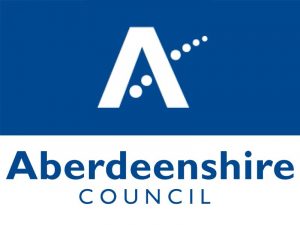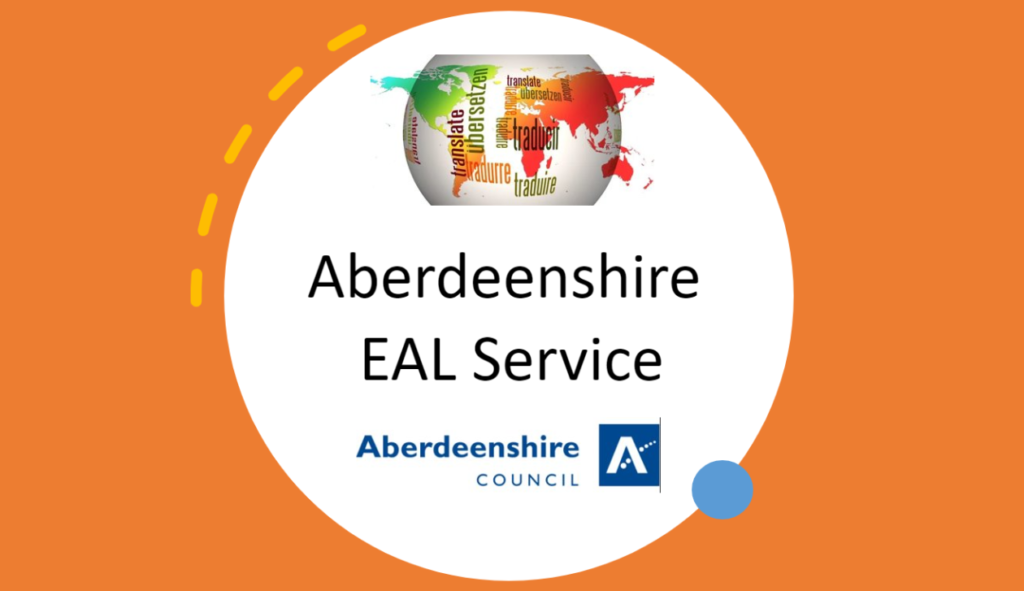 In Aberdeenshire, our EAL teachers have been working to find the best ways to support bilingual learners and their families throughout the pandemic, as well as class teachers. If adapting to the challenges of the pandemic and online learning were not hard enough, many children and families have also faced the language barrier, as well as perhaps not being familiar with the Scottish Curriculum and routines and norms that may be taken for granted as something all children and families will think of as normal. Over the last year, our EAL teachers have embraced new ways of working and have developed a range of resources and approaches. Telephone interpreting used to be very rarely used but has now seen demand skyrocket with a lot of positive feedback on its effectiveness in breaking down the language barrier and building relationships between school and family. On several occasions schools have been able to speak to parents who they had not previously managed to reach, and as a result have managed to overcome some barriers that had prevented families from accessing online learning. EAL teachers have also been supporting bilingual learners by sharing advice and resources with class teachers, and also working with some pupils through video conferencing, including teaching SQA ESOL courses. The service has also produced translated comments and videos to support families who may be having difficulty in engaging with online learning.
In Aberdeenshire, our EAL teachers have been working to find the best ways to support bilingual learners and their families throughout the pandemic, as well as class teachers. If adapting to the challenges of the pandemic and online learning were not hard enough, many children and families have also faced the language barrier, as well as perhaps not being familiar with the Scottish Curriculum and routines and norms that may be taken for granted as something all children and families will think of as normal. Over the last year, our EAL teachers have embraced new ways of working and have developed a range of resources and approaches. Telephone interpreting used to be very rarely used but has now seen demand skyrocket with a lot of positive feedback on its effectiveness in breaking down the language barrier and building relationships between school and family. On several occasions schools have been able to speak to parents who they had not previously managed to reach, and as a result have managed to overcome some barriers that had prevented families from accessing online learning. EAL teachers have also been supporting bilingual learners by sharing advice and resources with class teachers, and also working with some pupils through video conferencing, including teaching SQA ESOL courses. The service has also produced translated comments and videos to support families who may be having difficulty in engaging with online learning.
Translated comments
A range of translated comments were developed to support home-school communication and have been used to communicate one way information to families, with comments being successfully used to overcome barriers to engagement:
“Aberdeenshire EAL Service covers a wide geographical area with a number of rural remote communities where our families can be distributed and which can pose communication challenges, particularly when schools are closed to most pupils during this time. One of my larger small town schools, that has a wide catchment area, have a family who were not responding to school information circulars and letters home. I sent the school the translated comments information which included a translation and the school came back and said they found it very useful and were discussing whether to send the translations out to other EAL families across the school.”
Sue Clutterbuck (EAL Teacher)

Telephone interpreting
Translated letters have also been developed to communicate to parents when the school would like to make a call and offer options that the parent can highlight for when they would be available. This has resulted in several calls with parents being arranged when the school had previously found it difficult to reach the parents.
“I supported a teacher in one of my schools in using the telephone interpreting service for the first time. By using the translated letters we had produced, parents were able to tell her when they would be free and she was able to call them and speak to them for the first time through an interpreter.”
Ian Brownlee (PT of EAL)
Our service has been strongly encouraging schools to use telephone interpreting and in general the feedback has been great (see examples of feedback in the picture below).

Translated Videos
We also worked in partnership with Aberdeenshire’s Learning Through Technology Team to develop translated videos that guide pupils/parents on how to log in to glow and how to use Microsoft Teams and Google Classrooms. The videos were produced in the top five most common languages in Aberdeenshire and have been successfully used to support some families in overcoming barriers to accessing and engaging with online learning:
“They used the link, watched the video and it worked! Bingo. ☺️”
Sarah Jane Bennison (EAL Teacher)
“I sent the video on how to connect to google classrooms to 2 of the P1 teachers from one of my schools, I made sure they had a direct access to the video, so they didn’t have to look around for it. They sent the video to the parents of P1 pupils with little English, who had not been engaged and 1 child the following day was online and the other child the week after.”
Amanda Blackburn (EAL Teacher)
Colleagues in other local authorities have also given positive feedback on the videos:
“Of course, we have also been signposting homes to the brilliant videos on the use of ICT/GLOW/Teams on the Aberdeenshire site!”
“I’ve watched the translated glow videos your service have made – they are amazing! Would you mind if I shared that link with some of our schools?; the teams one and logging into glow are so valuable right now.”



